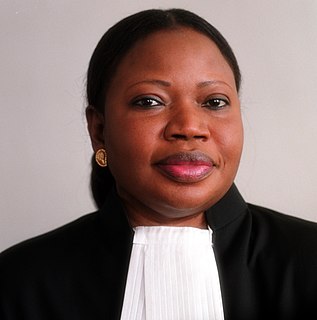A Quote by Neil Macdonald
There's a reason the United States opposes the very existence of the International Criminal Court, at least where American war crimes are concerned.
Related Quotes
I think the International Criminal Court could be a threat to American security interests, because the prosecutor of the court has enormous discretion in going after war crimes. And the way the Statute of Rome is written, responsibility for war crimes can be taken all the way up the chain of command.
I think the International Criminal Court could be a threat to American security interests, because the prosecutor of the court has enormous discretion in going after war crimes. And the way the Statute of Rome is written, responsibility for war crimes can be taken all the way up the chain of command. This is the sort of investigation that some people who live in Fairyland might like to undertake, but which bears no relationship at all to conditions in the real world.
In the string of amazing decisions made during the first year of the Obama administration, nothing seems more like sheer insanity than the decision to try foreign terrorists, who have committed acts of war against the United States, in federal court, as if they were American citizens accused of crimes.
It is well known that homosexuality is a criminal offense in the United States, in four US states. If it is good or bad, we know the decision of the Constitutional Court, but this problem has not been dealt with yet, it is still being addressed by the legislation of the United States. This is not the case in Russia.
Although we refer to the International Criminal Court, the real problem is the prosecutor, because it's the prosecutor who decides who to investigate and what cases to bring. This court fundamentally embodied a potential for abuse of governmental power that I felt was inconsistent with being a free person - and [it was] inconsistent for a free country like the United States to subscribe to it.
It would not be desirable to include 'terrorism' among international crimes subject to International Criminal Court jurisdiction if defined to apply only to anti-state acts of violence. The failure to include terrorism as a distinct crime was due to the inability to agree upon its proper definition.






























